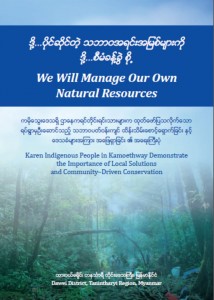We Will Manage Our Own Natural Resources: Karen Indigenous People in Kamoethway Demonstrate the Importance of Local Solutions and Community–Driven Conservation
By Rays of Kamoethway Indigenous People and Nature and Tenasserim River and Indigenous People Network • March 24, 2016 This piece of community initiated action research reveals a number of lessons we can learn. The authors try to reflect the challenges of and opportunities for community based natural resources management in a seemingly forgotten Karen controlled area of southern Myanmar. The paper examines a number of case studies including the construction of a local water supply system, the establishment of fish conservation zones and community-driven forest conservation. An evolutionary development of community based networks such as CSLD (Community Sustainable Livelihood and Development), TRIP-NET (Tenasserim River and Indigenous People Network) and RKIP (Rays of Kamoethway Indigenous People and Nature) and their collaborative action to address emerging Natural Resources Management issues in their land are well illustrated in the paper.
This piece of community initiated action research reveals a number of lessons we can learn. The authors try to reflect the challenges of and opportunities for community based natural resources management in a seemingly forgotten Karen controlled area of southern Myanmar. The paper examines a number of case studies including the construction of a local water supply system, the establishment of fish conservation zones and community-driven forest conservation. An evolutionary development of community based networks such as CSLD (Community Sustainable Livelihood and Development), TRIP-NET (Tenasserim River and Indigenous People Network) and RKIP (Rays of Kamoethway Indigenous People and Nature) and their collaborative action to address emerging Natural Resources Management issues in their land are well illustrated in the paper.
Local Karen people used participatory approaches and FPIC tools in their planning and decision making processes. The application of indigenous knowledge demonstrated that local wisdom regarding natural resource management – such as the management of medicinal forests – can provide tangible benefit to local communities.
Download this full Report in English here.
အစီရင္ခံစာ ျမန္မာဘာသာကုိ ဤေနရာတြင္ ရယူႏိုင္သည္။
Tags: Business and Human Rights, Human Rights, Karen State, Natural Resources, Rays of Kamoethway Indigenous People and Nature, Tenasserim River & Indigenous People NetworksThis post is in: ASEAN, Business and Human Rights, Displacement, Economy, Environmental and Economic Justice, Ethnic Nationalities, Health, Human Rights, Law, Military Regime
Related PostsKaren State September 2016 Conflict: The Real Motivations Behind Renewed War
Burma Army’s actions in Karen State threaten to expand fighting, endangering peace process and displaced people’s return
Ann Din Coal Power Plant: Local Movement and Action to Preserve and Protect Natural Resources and Land: Mon IDP Report Case Study #4
New film: Shan State’s unique “Thousand Islands” under threat from Salween dam plans
EU Must Continue UN General Assembly Resolution on Burma









 All posts
All posts